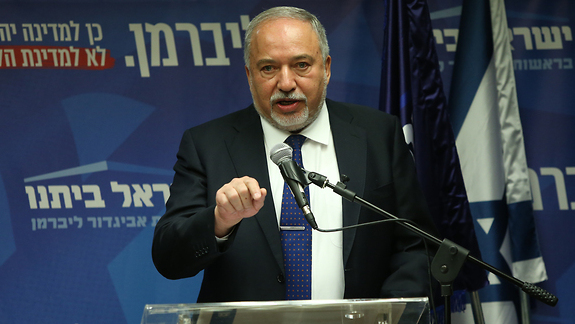Israel's likely new finance minister, Avigdor Liberman, said on Thursday that economic growth and raising the number of ultra-Orthodox Jews in the workforce would be his main goals.
Liberman's Yisrael Beiteinu and seven other parties reached a coalition agreement on Wednesday night that would unseat Prime Minister Benjamin Netanyahu if it is ratified by parliament.
"This coalition will focus mainly on economic issues," Liberman, a former defense minister, told Israel's Channel 13.
He said one major challenge would be to bring Israel's "unreasonable" budget deficit under control.
Another was to bring ultra-Orthodox men into the labor force - currently only around half of them work, the others are devoted full-time to religious studies and rely on government allowances and handouts from donors.
"We will do everything to provide them an education and enable them to learn a profession and stand on their own two feet, as opposed to charity and stipends," he said.
But the main goal was to heal the economy, he said. "We are a country that hasn't had a budget for the past two years already," he said.
On the heels of the COVID-19 pandemic, Israel's economy contracted 2.6% in 2020 but could see growth of as much as 6% this year.
4 View gallery


The study hall at the Max and Ruth Schwartz Hesder Yeshiva in Sderot
(Photo: Reuters)
Similarly, the budget deficit jumped to 11.6% last year from 3.7% in 2019 due to large stimulus spending to help businesses and households cope with the crisis.
"It's terrible," Lieberman said of the higher deficit. "Generally the government's deficit target is 2.5% or 2.7%. When you jump from 2.5% to 11.6%, that's unreasonable."
Israel is using a pro-rated version of a base budget from 2019 that was approved in mid-2018.
4 View gallery


Thousand of protesters demonstrated in Tel Aviv against the government's conduct in dealing with the economic crisis caused by the first COVID wave, August 2020
(Photo: Tal Shahar)
Liberman said he plans to implement a comprehensive economic stability program "to create growth because you have to increase the budget, not the budget deficit".
Once he takes office, he said, his first phone calls will be to the central bank governor and the heads of the Manufacturers' Association and Histadrut Labor Federation.
When asked whether he would raise taxes, Lieberman said, "that's not effective". But he did not rule out higher taxes as part of a broader plan.



